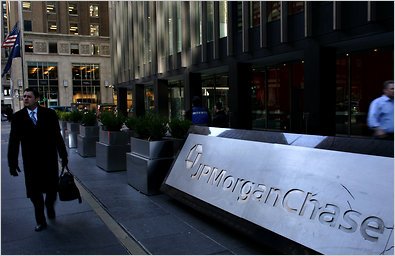
JPMorgan Chase, the biggest US bank, has revealed a surprise trading loss of $2 billion on complex investments made by its traders.
Overall, after accounting for other gains, losses at its chief investment office (CIO) are estimated to come in at $800 million in the second quarter.
The loss could be as big as $1 billion, chief executive Jamie Dimon said in an unscheduled conference call.
JPMorgan shares fell 6% after-hours, with other bank stocks following.

Goldman Sachs, Citigroup and Bank of America also suffered heavy losses in electronic trading after the market close.
The strategy taken at its CIO had been “riskier, more volatile and less effective” than previously believed, Jamie Dimon said.
“There were many errors, sloppiness and bad judgement. These were egregious mistakes.
“They were self-inflicted and this is not how we want to run a business.”
The CIO is an arm of the bank used to make broad bets to hedge its portfolios of individual holdings. Hedging is an investment practice used to reduce the risk of price fluctuations to the value of an asset.
The trading loss, revealed in a regulatory filing, is expected to hurt JPMorgan’s overall earnings in the quarter, and will come as an embarrassment to the bank.
It had emerged from the 2008 financial crisis in much better health than many of its rivals after avoiding risky investments that had hurt others.
“We will admit it, we will learn from it, we will fix it, and we will move on,” Jamie Dimon said.
He added that the bank was trying to unload the portfolio in question in a “responsible” manner in order to minimize the cost to shareholders.
Jamie Dimon said the type of trading that led to the loss would not be banned by the so-called Volcker rule, designed to censure certain types of trading by banks with their own money.
But he acknowledged that the errors would be particularly embarrassing, given his public criticism of the Volcker rule.
“It plays right into the hands of a bunch of pundits out there, but that’s life,” he said.
Prof. Mark Williams from Boston University, and a former Federal Reserve regulator, said taxpayers should be concerned about these trading losses.
“Taxpayers ultimately have to bail out these <<too big to fail>> banks. And that’s what JPMorgan is – it is too big to fail,” he said.
“How could a bank that’s supposed to be the premier bank in setting the leadership role allow such risk taking?”